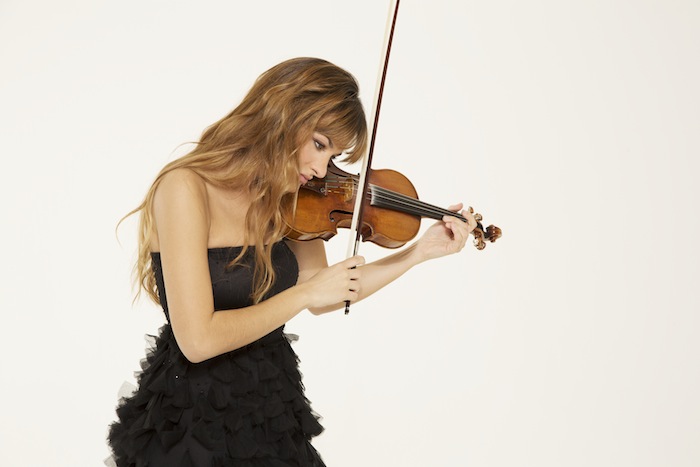Eschenbach, NSO present a contrasted program of Marsalis, Tchaikovsky

Nicola Benedetti performed Wynton Marsalis’ Concerto in D with Christoph Eschenbach and the National Symphony Orchestra Thursday night.
This week’s program from the National Symphony Orchestra is an easy sell in theory. Christoph Eschenbach is pairing a big, beefy Tchaikovsky symphony with a new violin concerto by Wynton Marsalis, the jazz trumpeter with popular appeal. The idea, presumably, was that such a program would open the doors wide for an influx of untapped audience members – classical newbies, jazz fans, and millennials.
Not only did those elusive groups not take the bait, but Thursday night’s half-filled Kennedy Center Concert Hall indicated that the symphonic base had stayed home, too.
Marsalis, a brilliant performer and arranger, began dabbling with the orchestra a few years ago. His Blues Symphony and Swing Symphony involved major orchestras in Atlanta, Boston, Los Angeles, Berlin, London, and New York. Last year Marsalis added his Concerto in D (for Violin and Orchestra), premiered by the London Symphony Orchestra. The intended soloist, violinist Nicola Benedetti, has been making the rounds of the co-commissioning orchestras, and Christoph Eschenbach joined the ranks of conductors to shepherd along this easy-listening work.
Benedetti had her most engaging moments in the opening of the first movement, with a whiskey-voiced tone on the G string. Blue notes bent the solidly Hollywood harmonic idiom toward jazz, with forays into Latin rhythms, a piercing Shostakovich march, and a tribute to Piazzolla. Ties were loosened metaphorically with overused devices: foot stamping, clapping, a piercing whistle, boozy trombone slides. Towards the end the brass section stood up, blasting away like a New Orleans street band, complete with sousaphone.
Multimetric rhythmic patterns eluded Benedetti at times in the second movement, and she lost the thread of the long cadenza that introduces the third movement. The piece is burgeoning with ideas, none of which go anywhere in particular, although it runs over forty minutes in length. A firm editor is just what is needed, a critical but friendly hand to slice away about 40% of the fat. Instead of finding a conclusion, Marsalis just had Benedetti walk off stage on a repeated final motif, a hackneyed variation on the pop song fade-out.
Hans Graf was the last to conduct Tchaikovsky’s Third Symphony (“Polish”) with the NSO in 2012. Christoph Eschenbach’s tendency to wring the last bit of intensity from a score does not go well with Tchaikovsky’s tendency toward repetition and bombast. This music works best with a conductor willing to streamline the obsessive reiteration, rather than inspecting every detail. Eschenbach wallowed too much in soupy rubato in the second and third movements especially.
That said, the NSO musicians sounded in top form in this moody, dance-infused piece. The wind and brass principal players, many of whom had sat out the first half, all contributed outstanding solo work. The solitary oboe melody of the first movement’s second theme, echoed by the flute, was poignant. The horn section, which plays such a crucial role in the introduction and throughout the first movement, sounded heraldic and unified.
The two dance movements, which sandwich the central slow movement, were rendered with balletic grace. The fourth-movement “Scherzo” was taken at such a fast that it became unstable in the blurred runs, especially in the woodwinds. The strings sounded impressively lush in the sensuous third movement, matched by accomplished solos from bassoon, horn, and oboe. Fortunately, Eschenbach stopped smelling the roses by the fifth movement, keeping the urgency of the music building, even as Tchaikovsky tried to halt momentum by including an absurd fugue. When the trumpets came in with their regal chorale section, it made for a triumphant conclusion.
Given the length of the two principal works, yet more Tchaikovsky was not an inspired idea. Even so, the concert opener, the hardly subtle “Polonaise” from Eugene Onegin, gave some late arrivals a chance to make it to their seats.
The program will be repeated 8 p.m. Saturday. kennedy-center.org/calendar/event/NRCSB; 202-467-4600.
